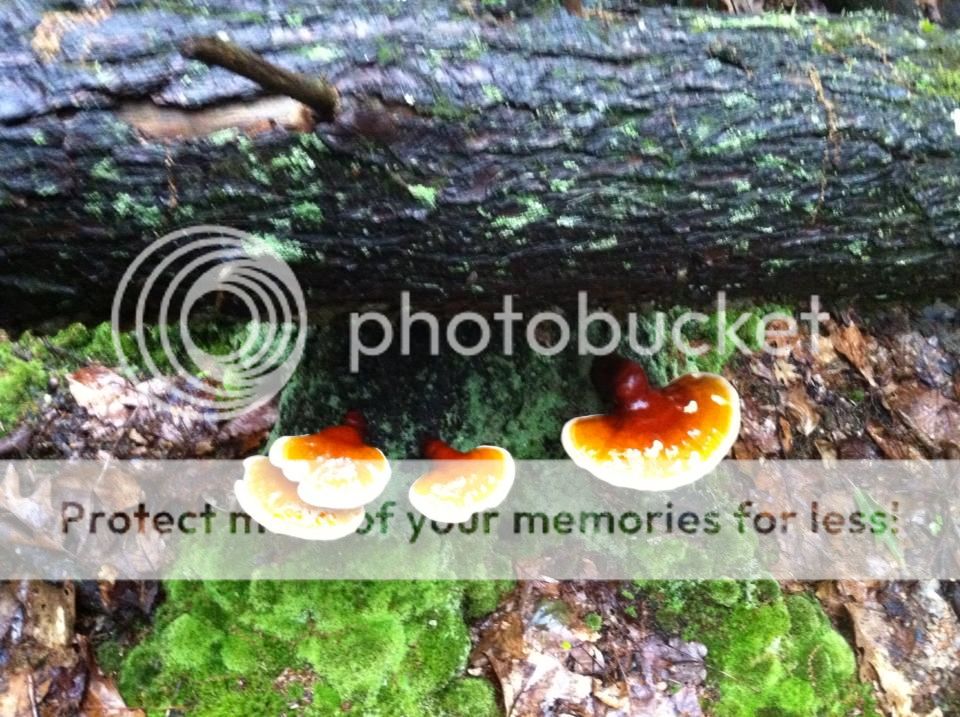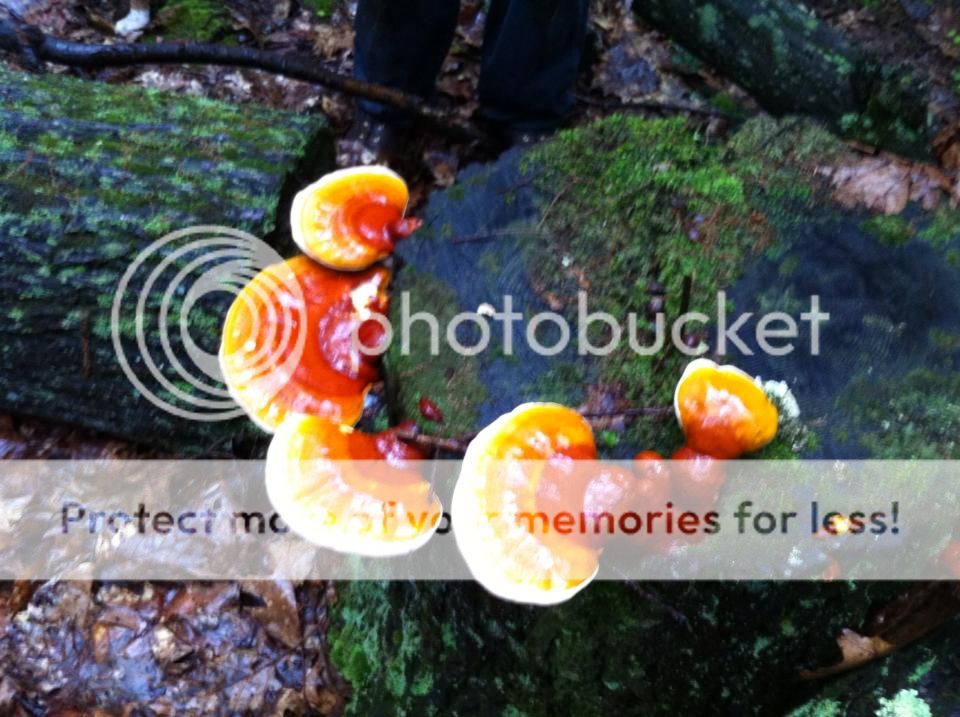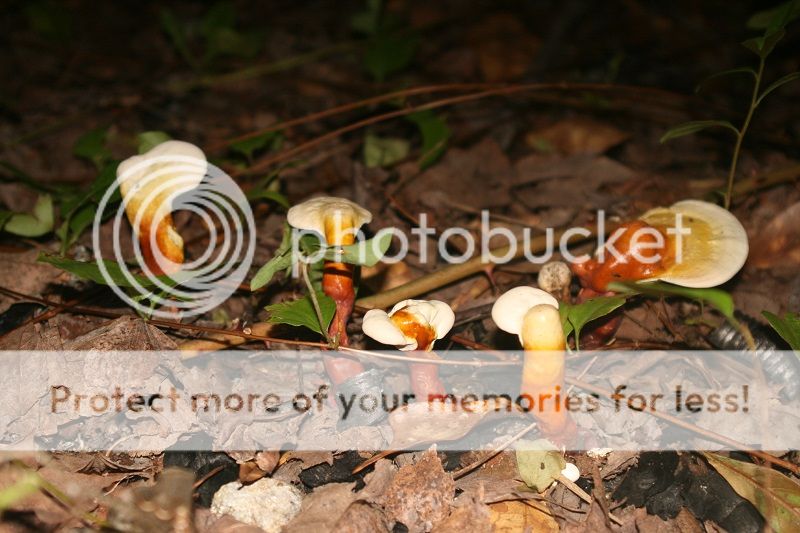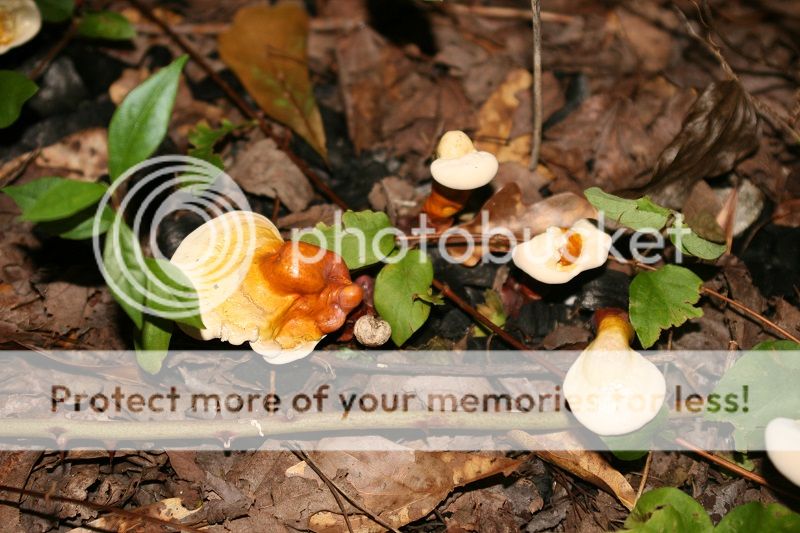It looks like you're using an Ad Blocker.
Please white-list or disable AboveTopSecret.com in your ad-blocking tool.
Thank you.
Some features of ATS will be disabled while you continue to use an ad-blocker.
10
share:
Mods i put this in the science section because this is apart of nature and i think people will enjoy learning about these little morsels!!
Today I went hiking with a friend of mine and yes, we are mushroom hunters, today we found the Lingzhi mushroom which is a medicinal mushroom. Here are a few pictures i took of the ones that we picked.
 " target='_blank' class='tabOff'/>
" target='_blank' class='tabOff'/>
 " target='_blank' class='tabOff'/>
" target='_blank' class='tabOff'/>
Here is some information on these interesting little fellas....
Lingzhi
Here is a little video on how to prepare these beautiful wonderful mushrooms into a tea.
These mushrooms allegedly help you with HIV/AIDS, Hep C, the flu, cancer, and many other things. I live in the north east in the US. It was about 70 degrees out and raining hard all day today. I found them in a thick foresty area with pine trees, maples and many other various trees that grow in this area. Anyway i hope you all enjoy this read.
Today I went hiking with a friend of mine and yes, we are mushroom hunters, today we found the Lingzhi mushroom which is a medicinal mushroom. Here are a few pictures i took of the ones that we picked.
Here is some information on these interesting little fellas....
Lingzhi
The lingzhi mushroom or reishi mushroom (traditional Chinese: 靈芝; pinyin: língzhī; Japanese: reishi; Vietnamese: linh chi; literally: "supernatural mushroom") encompasses several fungal species of the genus Ganoderma, and most commonly refers to the closely related species, Ganoderma lucidum and Ganoderma tsugae. G. lucidum enjoys special veneration in East Asia, where it has been used as a medicinal mushroom in traditional Chinese medicine for more than 2,000 years,[1] making it one of the oldest mushrooms known to have been used medicinally. Lingzhi is listed in the American Herbal Pharmacopoeia and Therapeutic Compendium. Ganoderma lucidum View the Mycomorphbox template that generates the following list Mycological characteristics pores on hymenium cap is offset or indistinct hymenium attachment is irregular or not applicable stipe is bare or lacks a stipe spore print is brown ecology is saprotrophic or parasitic edibility: edible Lingzhi mushroom Chinese name Traditional Chinese 靈芝 Simplified Chinese 灵芝 Literal meaning supernatural mushroom [show]Transcriptions Korean name Hangul 영지 [show]Transcriptions Japanese name Kana レイシ Kyūjitai 靈芝 Shinjitai 霊芝 [show]Transcriptions Contents
Lingzhi possesses anti-tumor, anti-cancer, immunomodulatory and immunotherapeutic activities, supported by studies on polysaccharides, terpenes, and other bioactive compounds isolated from fruiting bodies and mycelia of this fungus (reviewed by R. R. Paterson[17] and Lindequist et al.[43]). It has also been found to inhibit platelet aggregation, and to lower blood pressure (via inhibition of angiotensin-converting enzyme[44]), cholesterol, and blood sugar.[45]
Laboratory studies have shown anti-neoplastic effects of fungal extracts or isolated compounds against some types of cancer, including epithelial ovarian cancer.[46] In an animal model, Ganoderma has been reported to prevent cancer metastasis,[47] with potency comparable to Lentinan from Shiitake mushrooms.[48]
Here is a little video on how to prepare these beautiful wonderful mushrooms into a tea.
These mushrooms allegedly help you with HIV/AIDS, Hep C, the flu, cancer, and many other things. I live in the north east in the US. It was about 70 degrees out and raining hard all day today. I found them in a thick foresty area with pine trees, maples and many other various trees that grow in this area. Anyway i hope you all enjoy this read.
edit on 13-6-2013 by onequestion because: (no reason given)
edit on 13-6-2013 by onequestion because: (no reason
given)
edit on 13-6-2013 by onequestion because: (no reason given)
I don't know the mushrooms well, I know a few that grow on trees and of course morrels. I know three of the edible mushrooms that grow around here.
Chicken and hen of the woods, and oyster mushrooms. I know the ones that grow on birch trees to, they make a good addition to coffee grounds when
making coffee.
reply to post by onequestion
BE VERY CAREFUL!, mushrooms look very very similar sometimes and Iwouldnt want you to be consuming something poisonous. Its happened ALOT even with plants, it can be very confusing. In many cases people have died from consuming the wrong plant, mushroom. and you must also check its structure because there could be slight chance that one of those mushrooms are infected.
Even if you believe they are fine i really suggest that you just take a sip of the tea and then wait 30 minutes if your feeling well then take another sip. after an hour or 2 if you feel normal that it should be ok but if start feeling bad like nausea then stop drinking it immediately
BE VERY CAREFUL!, mushrooms look very very similar sometimes and Iwouldnt want you to be consuming something poisonous. Its happened ALOT even with plants, it can be very confusing. In many cases people have died from consuming the wrong plant, mushroom. and you must also check its structure because there could be slight chance that one of those mushrooms are infected.
Even if you believe they are fine i really suggest that you just take a sip of the tea and then wait 30 minutes if your feeling well then take another sip. after an hour or 2 if you feel normal that it should be ok but if start feeling bad like nausea then stop drinking it immediately
edit on
13-6-2013 by Tlexlapoca because: (no reason given)
Nice find! I do a bit of foraging here on the west coast, never found those before tho. Just lots of delicious chanterelles.
Never heard about the health benefit of them either so thanks for the info!
Never heard about the health benefit of them either so thanks for the info!
reply to post by Tlexlapoca
Oh yeah, i start with a teaspoon. Luckily these dont have a poisonous look alike.
Oh yeah, i start with a teaspoon. Luckily these dont have a poisonous look alike.
reply to post by onequestion
well atleast its good to know that you've done this before, Ive seen similar mushrooms to those where i live except that the ones ive seen are white and they usually grow on dead oak trees The ones you show on that pic are bright red
Its funny cause about a year ago i also was collecting weird mushrooms but i never ate them
well atleast its good to know that you've done this before, Ive seen similar mushrooms to those where i live except that the ones ive seen are white and they usually grow on dead oak trees The ones you show on that pic are bright red
Its funny cause about a year ago i also was collecting weird mushrooms but i never ate them
edit on 13-6-2013 by Tlexlapoca
because: (no reason given)
In Chinese medicine ,reishi are called lingzhi .
They've been studied extensively in the USA ,at Sloan kettering cancer hospital ,and have many beneficial uses .
It's in many herbal formulas .
Here is a recipes using it in a medicinal soup that is used to boost immunity .
It doesn't note them in the recipe,but you add a few in same time you cook the onions .
chinese.herbs.webs-sg.com...
Lingzhi soup
750 ml (3 cups) water 12 gm Astragalas (huang qi) 8 gm Atractylodes (bai zhu) 4 gm Ledebouriella Root (fang feng) 12 gm Chinese Wolfberry (gou qizi) 5 pitted red dates (hong zao), rinsed 2 small chunks margarine 1 tablespoon diced onion One 418-gm can sweet corn 250 ml (1 cup) chicken stock 2 tablespoons chestnut flour or corn flour, mixed with 2 tablespoons water 1 teaspoon salt, or to taste
Lingzhi 靈芝 Action:
1. Bring the water to a boil in a saucepan. Add all the herbs and cook over high heat for 5 minutes. Reduce the heat to low and simmer uncovered until the broth reduces to about 250 ml (1 cup). Strain and reserve the broth. Discard the dregs.
2. Heat the margarine over medium heat in a saucepan. Stir-fry the onion until fragrant, 1 to 2 minutes, then pour in the broth, sweet corn and chicken stock. Bring the mixture to a boil and stir in the chestnut and corn flour mixture to thicken the soup. Season with the salt and remove from the heat. Serve immediately.
They've been studied extensively in the USA ,at Sloan kettering cancer hospital ,and have many beneficial uses .
It's in many herbal formulas .
Here is a recipes using it in a medicinal soup that is used to boost immunity .
It doesn't note them in the recipe,but you add a few in same time you cook the onions .
chinese.herbs.webs-sg.com...
Lingzhi soup
750 ml (3 cups) water 12 gm Astragalas (huang qi) 8 gm Atractylodes (bai zhu) 4 gm Ledebouriella Root (fang feng) 12 gm Chinese Wolfberry (gou qizi) 5 pitted red dates (hong zao), rinsed 2 small chunks margarine 1 tablespoon diced onion One 418-gm can sweet corn 250 ml (1 cup) chicken stock 2 tablespoons chestnut flour or corn flour, mixed with 2 tablespoons water 1 teaspoon salt, or to taste
Lingzhi 靈芝 Action:
1. Bring the water to a boil in a saucepan. Add all the herbs and cook over high heat for 5 minutes. Reduce the heat to low and simmer uncovered until the broth reduces to about 250 ml (1 cup). Strain and reserve the broth. Discard the dregs.
2. Heat the margarine over medium heat in a saucepan. Stir-fry the onion until fragrant, 1 to 2 minutes, then pour in the broth, sweet corn and chicken stock. Bring the mixture to a boil and stir in the chestnut and corn flour mixture to thicken the soup. Season with the salt and remove from the heat. Serve immediately.
edit on 6/14/13 by PtolemyII because: (no reason given)
reply to post by onequestion
i shall try it myself aswell, let me know how it goes...especially if you enter another realm or something
i shall try it myself aswell, let me know how it goes...especially if you enter another realm or something
Originally posted by onequestion
reply to post by Tlexlapoca
Luckily these don't have a poisonous look alike.
I do not know of any poisonous polypore mushrooms. I literally just found some of these medicinal marvels in an old dead-fall burn site I have on my property.


Love Mushrooms! Grow Wine Caps, Phoenix oysters and trying morels this year.
J.B.
edit on 16-6-2013 by J.B. Aloha because: 2nd Pic
edit on 16-6-2013 by J.B. Aloha because: (no reason given)
reply to post by onequestion
I read an excellent section, complete with pictures, on mushrooms in a gardening book. I can't recall if it was Gaia's Garden by Hemenway or Edible Forest Gardens by Jacke and Toensmeier.
The author was growing a few types of mushrooms in a designated section of his yard. This was mostly consisting of several long logs thrown together, 5 to 7 feet long maybe, and about a dozen logs if I recall. They were in a shady location and the area was watered frequently. Multiple beautiful mushrooms were on the logs in the picture taken for the book. This was also in the NE USA, where you and your friend are.
If you like these mushrooms so much and they are so beneficial, you might do a little bit of research and see if they can't be grown right on your property fairly easily. I know I'd just think I was the bomb if I could waltz right outside and grab up a mushroom to make some tea with. Doesn't look like these grow where I am though.
Nice post! Always enjoy seeing gardening and self sufficiency type things.
I read an excellent section, complete with pictures, on mushrooms in a gardening book. I can't recall if it was Gaia's Garden by Hemenway or Edible Forest Gardens by Jacke and Toensmeier.
The author was growing a few types of mushrooms in a designated section of his yard. This was mostly consisting of several long logs thrown together, 5 to 7 feet long maybe, and about a dozen logs if I recall. They were in a shady location and the area was watered frequently. Multiple beautiful mushrooms were on the logs in the picture taken for the book. This was also in the NE USA, where you and your friend are.
If you like these mushrooms so much and they are so beneficial, you might do a little bit of research and see if they can't be grown right on your property fairly easily. I know I'd just think I was the bomb if I could waltz right outside and grab up a mushroom to make some tea with. Doesn't look like these grow where I am though.
Nice post! Always enjoy seeing gardening and self sufficiency type things.
That was pretty interesting. Some mushrooms, however, are famous for more than their taste. Known as magic mushrooms, shrooms, mushies, psychedelic
mushrooms, psychotropic mushrooms or psilocybin, these mushrooms cause differences in mood, perception and behavior that are commonly known as
"tripping." Magic mushrooms have always been popular with some narcotic users. Now, one analysis finds that the same mushrooms might have uses in
psychotherapy. The research discovered that religious participants that took psilocybin, the
active narcotic in magic mushrooms, noted mystical experiences and better life satisfaction
14 months later.
new topics
-
President-Elect TRUMP Picks Former Florida A.G. PAM BONDI to be U.S. Attorney General.
2024 Elections: 1 hours ago -
A Mysterious Orb filmed over NYC by local news
Aliens and UFOs: 2 hours ago -
Putin will warn civilians in targeted areas
World War Three: 3 hours ago -
The Popular Vote does not matter
Political Issues: 4 hours ago -
Gaetz withdraws from attorney general consideration
US Political Madness: 7 hours ago -
Bridgewater Triangle
General Chit Chat: 7 hours ago -
Is Russia Using a New Type of Beam Weapon Against Ukraine?
Weaponry: 9 hours ago -
Here is why Western leaders in NATO have zero fear of nuclear warfare. At all. Zero.
World War Three: 10 hours ago -
International Criminal Court Issues Arrest Warrant For Netanyahu
Mainstream News: 11 hours ago
top topics
-
Well we know Putins ICBMs won't fail in their silos
World War Three: 13 hours ago, 13 flags -
International Criminal Court Issues Arrest Warrant For Netanyahu
Mainstream News: 11 hours ago, 13 flags -
Gaetz withdraws from attorney general consideration
US Political Madness: 7 hours ago, 12 flags -
racist rant, but she made the arguement to get rid of DEI
US Political Madness: 12 hours ago, 10 flags -
Putin will warn civilians in targeted areas
World War Three: 3 hours ago, 10 flags -
Is Russia Using a New Type of Beam Weapon Against Ukraine?
Weaponry: 9 hours ago, 10 flags -
Bridgewater Triangle
General Chit Chat: 7 hours ago, 7 flags -
The Popular Vote does not matter
Political Issues: 4 hours ago, 6 flags -
Here is why Western leaders in NATO have zero fear of nuclear warfare. At all. Zero.
World War Three: 10 hours ago, 5 flags -
President-Elect TRUMP Picks Former Florida A.G. PAM BONDI to be U.S. Attorney General.
2024 Elections: 1 hours ago, 5 flags
active topics
-
President-Elect TRUMP Picks Former Florida A.G. PAM BONDI to be U.S. Attorney General.
2024 Elections • 7 • : DBCowboy -
Putin will warn civilians in targeted areas
World War Three • 23 • : MauiWaui -
Yet another Hack...
Rant • 12 • : Irishhaf -
President-elect TRUMP Picks MATT GAETZ for his ATTORNEY GENERAL - High Level PANIC Ensues.
2024 Elections • 120 • : WeMustCare -
Is Russia Using a New Type of Beam Weapon Against Ukraine?
Weaponry • 15 • : Scratchpost -
-@TH3WH17ERABB17- -Q- ---TIME TO SHOW THE WORLD--- -Part- --44--
Dissecting Disinformation • 3341 • : dashen -
Here is why Western leaders in NATO have zero fear of nuclear warfare. At all. Zero.
World War Three • 6 • : CosmicFocus -
Well, here we go red lines crossed Biden gives the go ahead to use long range missiles
World War Three • 318 • : Tolkien -
Help in song interpretation
Music • 12 • : KrustyKrab -
Democrat county officials openly declare intention to commit ballot fraud in PA
2024 Elections • 22 • : WeMustCare
10

